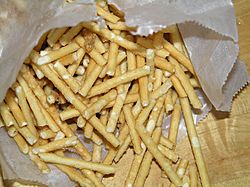Mein gon facts for kids
 |
|
| Alternative names | Crunchy noodles |
|---|---|
| Type | Cracker |
| Place of origin | United States |
| Mein gon | |||||||||||
|---|---|---|---|---|---|---|---|---|---|---|---|
| Traditional Chinese | 麵乾 | ||||||||||
| Simplified Chinese | 面干 | ||||||||||
|
|||||||||||
Mein gon (pronounced "mee-an gahn") is a special kind of cracker shaped like noodles. People often call them crunchy noodles or crunchy chow mein. Even though they look like noodles, they are actually crispy crackers. You'll often find them in American Chinese cuisine, which is the style of Chinese food popular in the United States.
Contents
What is Mein Gon?
Mein gon gets its name from the Chinese words "miàn gān," which means "dried noodles." However, it's important to remember that these aren't real noodles. Instead, they are a type of biscuit or cracker that has been shaped to look like thin, crispy strands. They are made to be crunchy and add a nice texture to dishes.
How Mein Gon is Used
Mein gon is a popular addition to many dishes in American Chinese restaurants. It's mostly used to add a satisfying crunch.
Sprinkled on Chow Mein
One of the most common ways to enjoy mein gon is by sprinkling it over chicken chow mein. Chow mein is a dish with stir-fried noodles, vegetables, and often chicken. Adding mein gon on top makes the dish more interesting with its crispy texture. It's like adding croutons to a salad, but for noodles!
Topping for Salads
Mein gon can also be crumbled into smaller pieces and used as a topping for salads. For example, it's often added to Chinese chicken salad. Just like croutons, these crunchy bits give a nice contrast to the softer salad ingredients.
Appetizer with Sauces
Sometimes, crunchy fried chow mein noodles are served as an appetizer before the main meal. They come with dipping sauces like duck sauce and Chinese hot mustard. This is a simple and tasty way to start your meal at an American Chinese restaurant.
Why is it Called "Noodles" if it's a Cracker?
It might seem confusing that mein gon is called "crunchy noodles" when it's actually a cracker. This informal name probably comes from its noodle-like shape and its use in noodle dishes like chow mein. Even though it's not a traditional Chinese noodle, it plays a similar role in adding texture and flavor to meals.
See also
 In Spanish: Mein gon para niños
In Spanish: Mein gon para niños
 | Selma Burke |
 | Pauline Powell Burns |
 | Frederick J. Brown |
 | Robert Blackburn |

